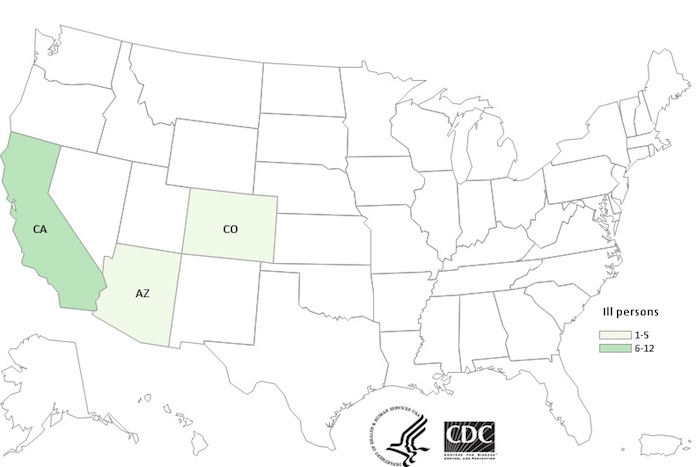A deadly fourth Salmonella outbreak linked to imported Maradol papayas has been reported by the Centers for Disease Control and Prevention (CDC). In this outbreak, linked to Salmonella Anatum infections, 14 people in 3 states are sick. Five people have been hospitalized. One person in California has died.

Three other outbreaks are also linked to imported Maradol papayas. In those outbreaks, 215 people have been sickened.
The case count by state is: Arizona (1), California (12), and Colorado (1). This outbreak is one of four separate outbreaks linked to Maradol papayas imported from Mexico.
Illnesses started on dates ranging from December 20, 2017 to April 8, 2017. The patient age range is from less than 1 year to 85, with a median age of 38. Ninety-two percent of patients are women. Among 11 people interviewed, 91% are Hispanic. And among those 11 people, 45% were hospitalized, which is a very high percentage for a Salmonella outbreak.
On September 4, 2017, the FDA found the outbreak strain of Salmonella ANatum from a sample taken from an imported papaya at the U.S.-Mexico border. Epidemiologic, traceback, and laboratory evidence indicates that Maradol papayas imported by Bravo Produce of San Isidro, California are the likely source of this outbreak. The papayas were packed by Frutas Selectas de Tijuana, S. de RL de CV and were distributed to California from August 10 to August 29, 2017.
Public health officials are using the PulseNet system to identify more people who may be part of this outbreak. Pulsed-field gel electrophoresis and whole genome sequencing are used to isolate the DNA of bacteria. Whole genome sequencing showed that isolates from people infected with the outbreak strain of Salmonella Anatum were closely related genetically, which means that the people in this outbreak likely shared a common source of infection.
The epidemiologic information indicated that the papayas were the likely source of this outbreak, but investigators couldn’t find the specific source of contaminated papayas until the outbreak ended. The sample that teated positive for the pathogenic bacteria came from a grower in Mexico named Productores y Exportadores de Carica Papaya de Tecomán y Costa Alegre in Tijuana, Mexico. Frutas Selects de Tijuana packed the fruit, and Bravo Produce imported it.
Bravo Produce recalled those Maradol papayas in September 10, 2017. They were distributed to California from August 10 to August 29, 2017. The label on the fruit reads, “Frutas Selectas de Tijuana.”
The CDC recommends that consumers not eat, retailers not sell, and restaurants not serve these papayas. This investigation is ongoing, and more ill persons may be identified. FDA is testing papayas imported from Mexico to see if any others are contaminated with bacteria.
The symptoms of a Salmonella infection include nausea, vomiting, diarrhea that may be bloody, abdominal pain and cramps, and a fever. People usually get sick 12 to 72 hours after exposure to the bacteria. Most people recover on their own. But a Salmonella infection can cause serious lifelong complications, including high blood pressure, reactive arthritis, and irritable bowel syndrome.
And since most people do not see a doctor when they contract a Salmonella infection, these cases are very underreported. The multiplier for Salmonella infections is 38. That means that there could be more than 500 people sickened in the outbreak.
Pritzker Hageman law firm helps people sickened by food contaminated with Salmonella and other pathogenic bacteria get answers, compensation and justice. We protect our client’s legal rights. Our lawyers represent patients and their families in personal injury and wrongful death lawsuits against growers, packers, distributors, grocery stores, food producers, shippers, dairies, restaurants, retailers, and schools. Attorney Fred Pritzker and his team of experienced lawyers recently won $7.5 million for young client whose kidneys failed after he developed hemolytic uremic syndrome because of an E. coli infection.




